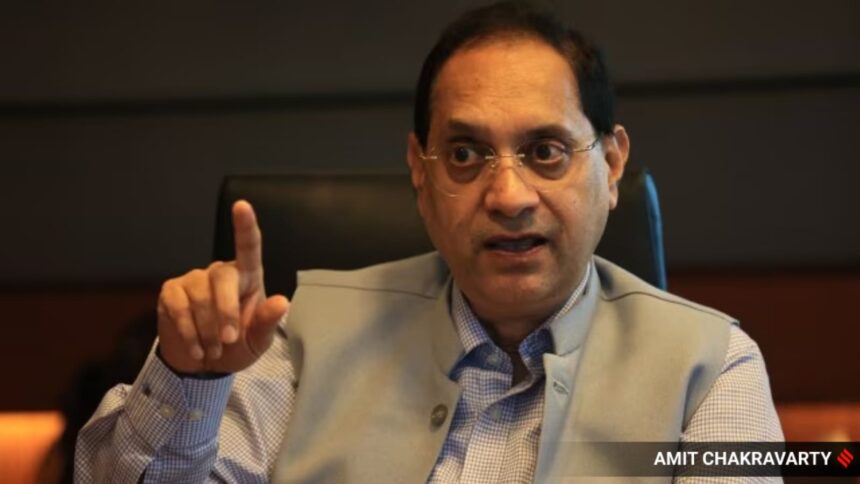As markets have remained choppy amid US President Donald Trump’s tariff war and geopolitical concerns including an armed conflict between India and Pakistan, the new chairman of the Securities and Exchange Board of India TUHIN KANTA PANDEY said that faith and conviction in the Indian markets is fairly strong from the domestic retail, mutual fund as well as the institutional levels. “On April 2, when the US announced reciprocal trade tariffs, we were the least affected and we were the fastest to recover,” he said in an interview with The Indian Express.
The first issue is that we have demonstrated a lot of resilience in the Indian markets. This is a time when there has been a change… the new administration and then April (US) tariff orders. So, practically, from March 1 onwards, there has been a lot of activity and volatility, in terms of policy. I think the markets have held up fairly well in India. The way Indian markets handled April 2 when it (US reciprocal tariffs) was announced, we were the least affected and we were the fastest to recover.
The market is now fairly counterbalanced by FPIs (foreign portfolio investors) and domestic institutional investors (DIIs). From the domestic retail, mutual fund as well as the institutional levels, I think faith and conviction in the Indian markets is fairly strong.
Indian markets, I would say, have been very resilient in these (uncertain times). Resilience also means that even that day (when armed conflict broke between India and Pakistan) when we were expecting turmoil, there were no extraordinary margin calls. There was, of course, a decline in the market, but then it recovered. While we were keeping it (markets) under watch, there were no extraordinary movements, the settlements were smooth, people could come in and exit with no difficulty, and there was no panic. This is a sign of the maturity of Indian markets. In my opinion, ease of entry and ease of exit are two sides of the same coin. If you have an ease of exit, it also ensures ease of re-entry.
Secondly, regarding the buffers — if large calls are taken, then do you have (enough) buffers in place? In terms of margin money, we ensure that nobody is playing with client funds. That is a very big security if you are investing as your funds are secure. We also do not allow anybody to play with client securities. This gives retail investors a confidence that their securities and money are safe with them.
There was an issue of conflict of interest within Sebi in the recent past. When you announced some measures, you also mentioned that you will make this conflict of interest public. How far has it progressed?
I had promised that we will set up a committee and a (high-level) committee has been constituted. They are already working quite hard and they have meetings and they are taking inputs. So in the next three months they will have the report.
I thought that narrative is there, so we have to address it. My issue was that let us address the narrative head-on. If you have a problem, in the sense that there are some questions, then we need to answer, but more in a system way. It cannot be sporadic. So, when I came here, we said we need to address (conflict of interest). I found that actually the issue required addressing, because there was also a lot of need and confusion here. In terms of conflict of interest, whenever you see the 2008 document that we had for the chairman and the board, and then there are employee regulations. I found there were virtually no public disclosures. So, some public disclosure may be there, may be of assets, may be of property, at least that’s the minimal expectation. They were also not there. The conflict of interest in SEBI’s case is much wider. It’s a very difficult concept… virtually the listed companies are everywhere. If Sebi officers are working, then where should they recuse and where should they not recuse? If you say that my cousin’s son and others are working or employed somewhere, I will not write orders. Is it okay? So you have to be really defining and clearly saying where the recusal will come, how the recusal will be recorded, and how the recusal will be maintained.
Therefore, what we suggested is (to) let an independent committee, with eminent, well-meaning people and lots of experience from different sides, have a look at it and suggest a framework. This framework then will come to the board and our board will take a view, and we will implement that framework. It will help… not only Sebi, but will also really put to rest this narrative that — we have 9something) to hide.
What we have to hide, we should hide in a manner, which is actually sort of mandated —means while you are investigating, you have to be hiding and you have to reveal only when your investigation is complete. But in terms of conflicts also, what is to be reported, what is not to be reported, to whom (it is) to be reported, how (it) is to be reported — this framework needs clarity. Otherwise, there will be confusion.
This has to be worked out with industry and concerned participants. So, different departments in Sebi are engaged with different interlocutors. Normally, they have committees, associations of different kinds, and also investor associations. There could be a difference between the large and small brokers also. They are taking up larger consultations. Wherever these points will be identified, they will work out on the time frame in which they can be handled, in terms of simplification. It is time to take a relook. Some of the regulations have already been changed and modified, but many of them have not been. It is an active process which is going on.
The market is growing and it has grown quite a lot. We need to accordingly increase our surveillance and enforcement actions. These have been strengthened a lot. If you see the capacity which we had five or 10 years back, it has now increased considerably, both in terms of tools and manpower. The workforce that we are hiring is young and quite technologically savvy. If you really look at some of the Sebi’s orders, you will find that a great deal of investigative work has gone into it, because we have to eventually prove to the court that we have caught it and this is the manipulation that is there. I would say that enforcement, surveillance and analysis will become our focus areas.
When you do a wider analysis, you will find the kind of people who are doing it (manipulations). Something can come as complaint-based and something can emanate from alerts. If we are trying to do things analytically, we can get a lot of alerts, and from those alerts we can do further analysis, which means that we do not have to wait for any complaint. We can ourselves look into what is happening, like if there is any ‘pump and dump’ case going on. I think we need to keep on developing a risk-based system.
We are watchful of the data. This (F&O segment) is one area which we have now taken up as an activity. We will be constantly watching and analysing the data in terms of what is happening in the market. In the weekly options on the expiry day, there was a kind of extreme activity happening — just before the expiry or on the expiry day. It was almost akin to some kind of betting. Certain sanitisation measures such as terms of size of the contract, margins, and even restricting the number of expiry days in a week, were taken. These were part of the consultation papers and we have received a lot of comments. We have had discussion on this and we will take new measures based on the inputs.
People are asking how we have managed T+1 (settlement cycle). We did it first and the US followed. Many countries do not have T +1 cycle.
The T+0 was not intended to be mandatory. Technology has been tested in some respects, but in order to take it further, we must also ensure that the largest number of participants must be comfortable and you have to ensure that everyone comes in. FPIs have to come in, and they should be comfortable too. There are time zone issues, and there is also an issue of moving the money at the right time. If you want everything on the same day, then the level of preparation for every participant has to be of that order where everyone is comfortable. For us to move from T+2 to T+1, it has taken almost a year in bits and pieces. So, we are giving it a little pause, at this moment, on proceeding from T+1 to T+0. Let us stabilise T+1. It (T+0) is not mandatory and very few people are using it.
Yes, we do. AI is both a strength for us as well as a threat to our system. We have to see how AI will also make our markets vulnerable. AI also gives us a tremendous amount of facility and we are using it. We are able to process documents much faster because AI is being used.
Even IOSCO (the International Organization of Securities Commissions) has taken note of this issue — it is a worldwide problem. We have been able to take down about 70,000 of them (finfluencers) coming with all kinds of YouTube videos and other social media things, with the help of (Alphabet-owned) and ( parent) Meta. We are doing (taking down) about 5,000 (finfluencers) a month but they spring up again violating the regulations with things like stock tips and return projections, etc. Now with Photoshop, cloning and fake videos, it is just a kid’s game. Here also we are using AI because how do we scout this as the universe is big?
Every day (we are carrying out the) taking down process (of finfluencers). We have also tried to throttle their business plan as often there used to be a link to some brokers. That has now been completely stopped. Our registered investment advisors know exactly what to say and what not to say. They will never give you such videos on stock tips.
This is one more area which requires a tremendous amount of work and we are going to do it in a massive way with our whole ecosystem and investor awareness. We are also issuing orders against intermediaries who are involved with promoters in exactly a ‘pump and dump’ strategy.
There is a balance. It is not that everyone is given that particular thing. Under (Section) 11B (of the SEBI Act), you can refuse to do a settlement. You can also have punishment of a different kind. But you have cases which have been going on for years. You have to prosecute some also. In many cases, an interim order will be necessary. For example, we had to debar some TV personalities completely after we found that they were involved in front-running.
These cases will come, but the settlement is as per the regulations. Regulations have certain guardrails. The amount itself also has certain increments, like you have a disgorgement amount. So, you disgorge everything, plus more or less there is a penalty.
We have a system where if suppose an investigation is done by one wing, the adjudication is by someone else. We have to move and close the cases, finalise, punish, get the money and disgorge. I think all instruments should be applied. It can’t be that we will not do settlements.








